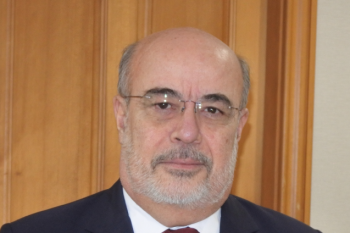Events

February 2019
H. E. Mr. José Maria Morais, Ambassador of the Republic of Mozambique
UPDATE: Mar 14, 2019
Focus on Promoting Private Sector Investments
—Mozambique lies on the east coast of Southern Africa. Would you tell us the current features of your country?
Mozambique, with a population of about 29 million, is blessed with abundant natural resources. The main industries are agriculture, fishery, mining, and tourism. We are developing our infrastructure including roads and railways, and there are transportation corridors running across Mozambique, connecting many ports along its long coastline to the neighboring landlocked countries. Our economy grew steadily and constantly in the past 25 years at the average rate of 7.5% annually. Although the growth slowed down after the financial crisis, the current rate remains around 4-5%. The country has a lot to offer to investors and tourists.
— Along with the termination of the civil war, Mozambique has been reborn as one of the most successful countries arbitrated by the United Nations. How did the peace process progress?
A peace agreement signed in 1992 marked the end of the civil war which continued for 17 years after the country gained independence. The peace process, although complex, is fortunately showing steady progress, which includes dialogues between opposition parties and democratization of legislation. Multi-party presidential and legislative elections have been held 5 times since 1994. And after the constitutional change for decentralization of administration, 5 local elections of municipal presidents and assembly members have been held. Although there was a small regional conflict, it was resolved 2 years ago, and now the whole country is peaceful.
— What kind of initiatives does the government implement to achieve the goals of the2015-2019 five-year plan?
We have many challenges related to poverty reduction and economic development. Our government has established 4 priority areas which are agriculture, infrastructure development, energy, and tourism. In the infrastructure development area, we focus on building schools, bridges, and roadways, and improving the regional supply of electricity. Mozambique is the largest energy exporter in Southern African nations, and provides aluminum, coal, and electricity. We have tremendous potential of energy development, and will begin exporting LNG in 2023. Tourism is another area with great potential for growth. Our long coastline, nature parks, and historic cultural heritage sites attract European and African visitors, as well as an increasing number of tourists from Asia including Japan. Also, agriculture is the fundamental of our economy. We are making efforts to develop and implement new technologies to improve our food production capacity and self-sufficiency. The level of poverty decreased from 90% to 45% in the past 25 years; and creation of jobs is needed to lower the levels of poverty even further.For this purpose, we encourage people to migrate from the cities to rural areas, or to stay in the rural areas with a view to developing such zones; and we also promote food processing industries in agricultural regions. Our competitive products are rice, maize, tea, coconuts, and other tropical fruits. Forty years ago, Mozambique was one of the world biggest producers of cashew nuts.
— Japan and Mozambique keep long-standing friendship. What is your priority mission for further strengthening the bilateral ties?
Mozambique and Japan have a special relationship. For the past 40 years, Japan has been our important development-related partner, providing us with a wide range of ODA totaling more than 2 billion US dollars for development and improvement of regional societies, infrastructure, and education. Japan also has trained a lot of Mozambicans for the purpose of human resources development. At the same time, the Japanese companies’ investment to our private sector is contributing greatly to our economic development. JICA’s volunteer programs and Japanese NGOs’ activities are helping us in the areas of regional development, agriculture, and education. In addition, we have frequent contact with an NPO in Ehime Prefecture and engage in active academic and student exchanges with Ehime University.
— What opportunities can Japanese companies expect for investing in Mozambique?
Would you suggest promising sectors and areas for Japanese investors? Japan’s 2013 investment agreement with Mozambique, the first of such agreement Japan signed with an African country, improved the investment environment in Mozambique. Some major Japanese trading companies are now operating in the mining and infrastructure sectors. All our industries, including agriculture and tourism, hold great promise for Japanese companies. Some of them are working on the development of railways and ports as part of the Nacala Corridor Project in northern Mozambique. I’m convinced that the strong presence of Japanese companies in our country and the bilateral ties in the public and private sectors will grow even further. Mozambique has a cooperative relationship with China also. Both Japan and China are important to us. All the actors of development in Mozambique complements each other, they are not in competition. Japan and China are very important players in the development of Mozambique. We value Japan’s great contribution in the strategic areas of natural resources and infrastructure.
(Interview by Shu Tamaru, FEC Counsellor)